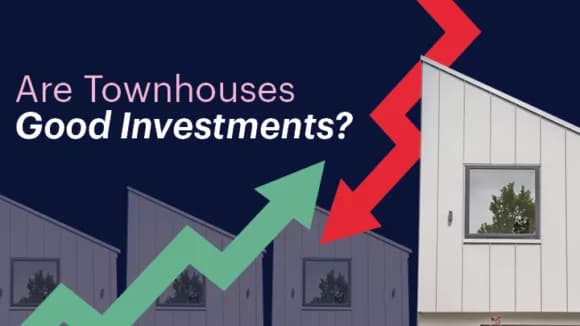
Property Types
Townhouses - Are they a good investment? An honest review
Thinking about investing in a townhouse? Here is an honest review of the pros and cons and whether this option is the right fit for your investment portfolio.
Property Types
12 min read

Author: Laine Moger
Journalist and Property Educator, holds a Bachelor of Communication (Honours) from Massey University.
Reviewed by: Ed McKnight
Resident Economist, with a GradDipEcon and over five years at Opes Partners, is a trusted contributor to NZ Property Investor, Informed Investor, Stuff, Business Desk, and OneRoof.
Apartments don’t grow in value as quickly as houses or townhouses.
But where apartments fall short in growth, they can sometimes make up for it with their higher-than-average yields … generally speaking.
With this in mind, are apartments a good investment? Apartments can be an appealing investment for first-time investors or those on a limited budget, offering an affordable entry point and potentially high yields despite slower growth. Their prime locations in city centers may also provide access to desirable areas that might otherwise be unaffordable.
In this article you’ll learn what an apartment is and how they stack up as an investment property.
Do you have a question or comment about apartments? Feel free to leave your thoughts in the comment section at the end of the page.
Apartments vs townhouses vs houses – what’s the difference?
With apartments you typically have neighbours on either side of your unit and you’ll often have homes above and below you too.
Apartment buildings can be large or small, but the key difference between an apartment and other property types is that there are multiple units stacked on top of one another.
Most apartments also share common areas, such as an underground car park, a lobby, and perhaps even common courtyards. This may also include a shared elevator, or even amenities such as a pool or a gym.
Because there are shared spaces, apartments also have a Body Corporate. This is an entity that governs the building.
A committee is typically elected from the owners of the units and each owner pays a share of the maintenance. Some owners pay more than others, depending on the type of apartment they own.
Not all apartments are the same. There tends to be 3 main types in New Zealand.
This is the most common apartment. It’s a single unit within a building that contains many units. There will likely be other units on the same floor as you, and you may use an elevator to get to your floor.
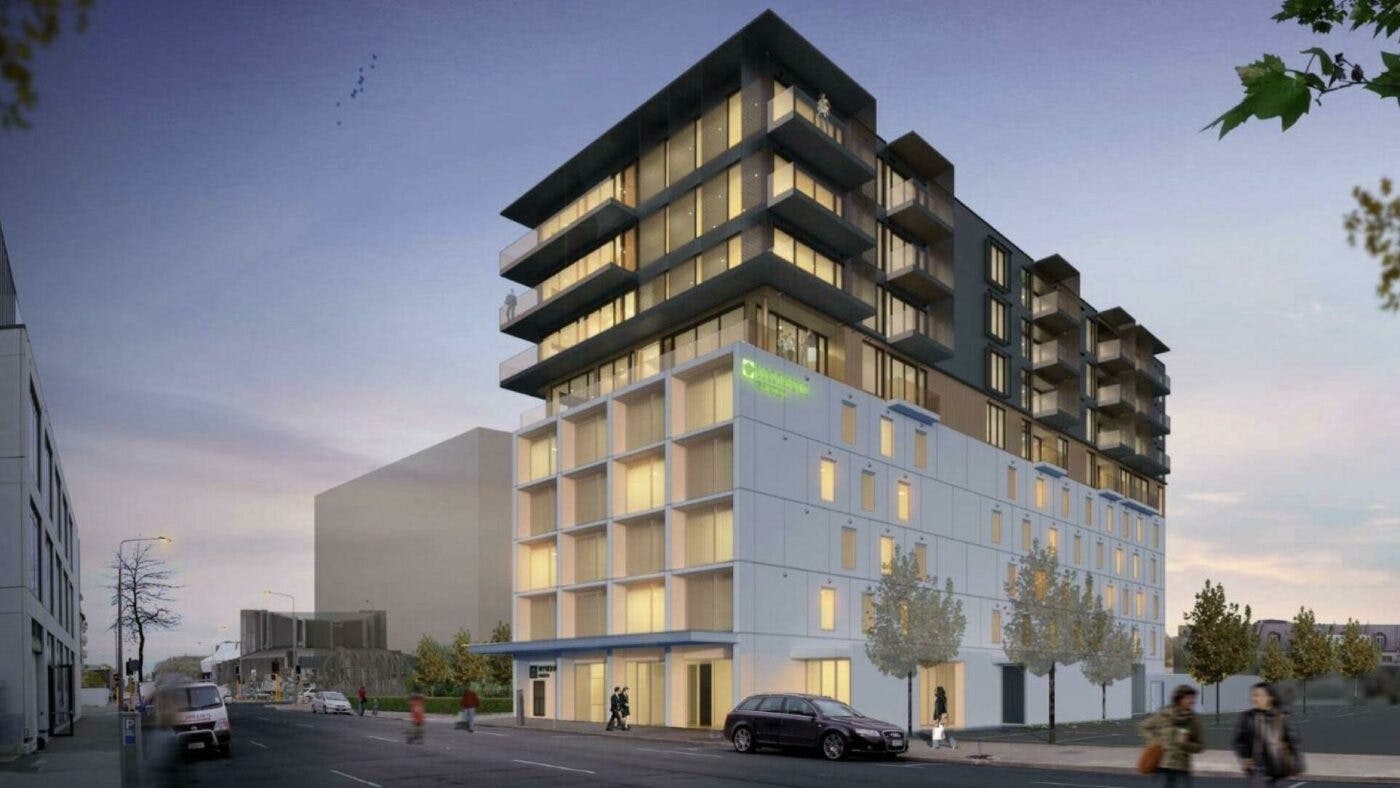
“Walk-ups” are a fancy way of saying an apartment with no lift. These are commonly found in New York. And because there isn’t a lift these apartment blocks tend to have fewer floors.
In addition, instead of a bunch of separate units being housed on the same floor, your apartment may have the whole floor to itself.
Walk-ups still have people above or below, but generally there is no shared elevator. This means you walk up the stairs to the apartment, hence the name.
Walk-ups were a feature in Hobsonville Point, Auckland.
Dual keys are a type of multi-income property.
Instead of having a single unit, a dual key has two separate, but adjoining, units held under one legal title.
So, from a tenant’s or home buyer’s perspective, the two apartments feel separate but legally they are the same property.
Again, this type of apartment is a new concept in New Zealand but is well established in some Asian countries.
Here’s a floor plan example from a development in Ellerslie, Auckland.
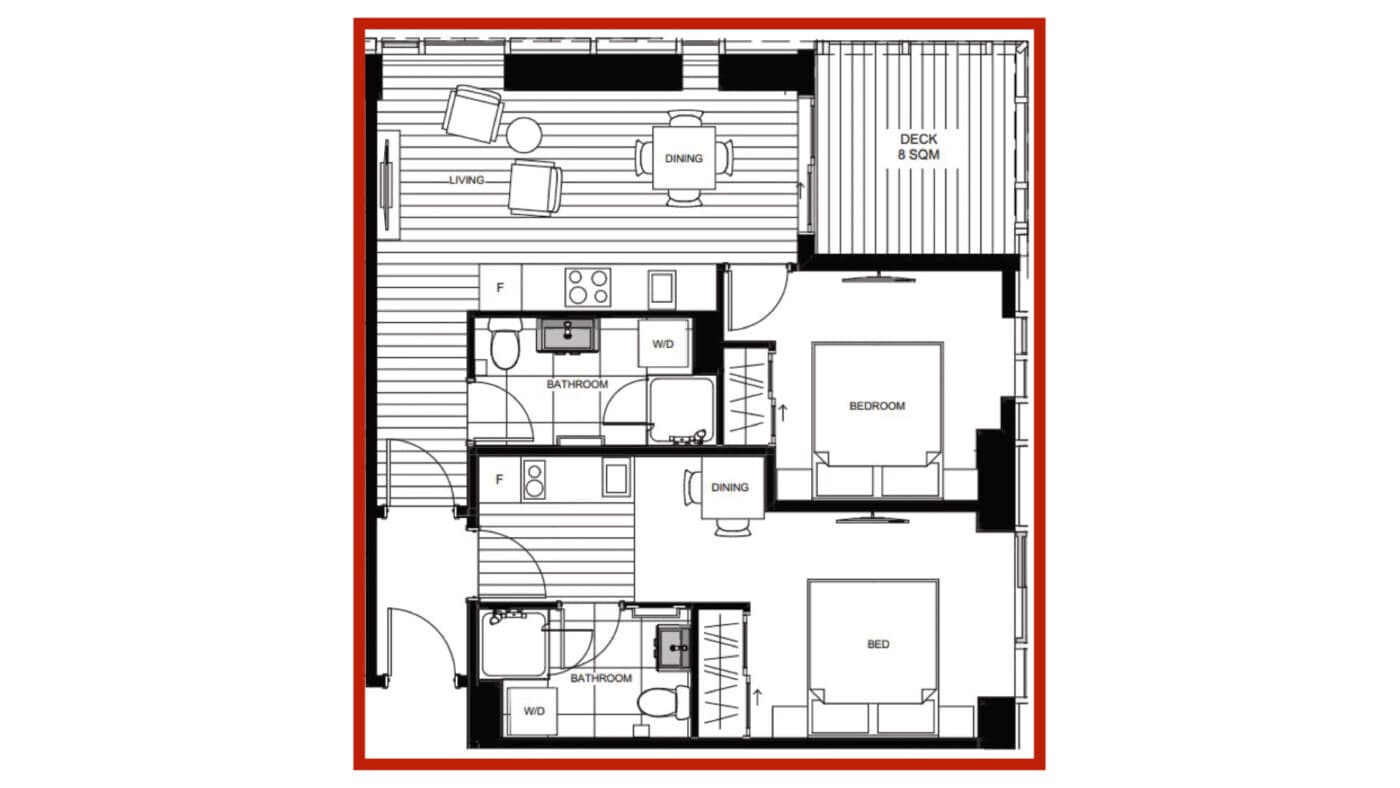
In the above example the size of the property is the same as a standard 2-bedroom apartment (75sqm). However, it is configured as a 1-bedroom and a studio.
For a property investor that means the two units can be rented separately to two different households under separate tenancy agreements. This means you can have two sources of income, which maximises your rental yield.
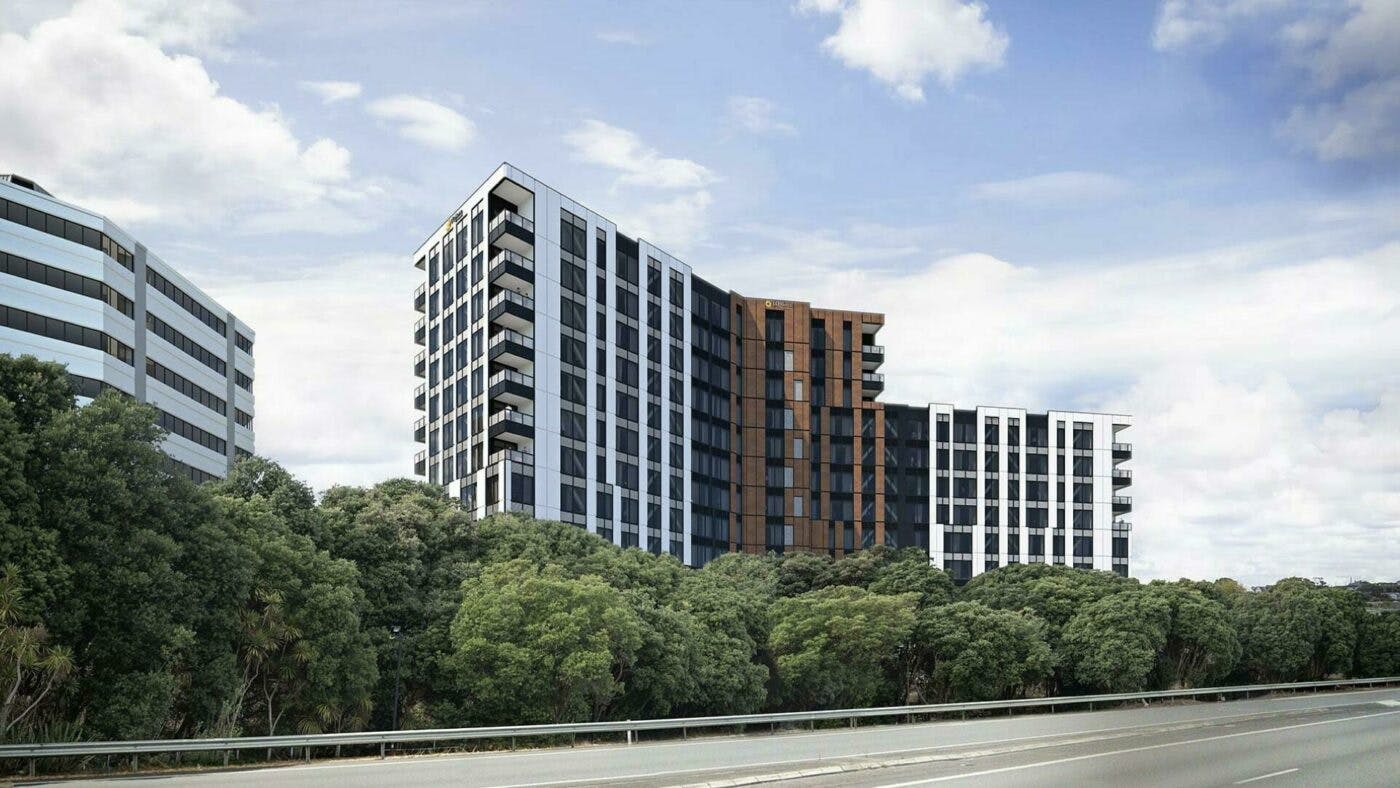
For instance, let’s take another look at Safari Group’s dual-key apartment in Ellerslie.
The rent was expected to be $515 for the one-bedroom, and $480 for the studio. That’s $995 of income per week. Based on the purchase price of $915,000, the property would generate a 5.7% gross yield.
From the tenant’s perspective, apart from a shared entrance way, they are totally separate.
According to Stats NZ, only 8.4% of all dwellings consented over the last 12 months (April 21 – Mar 22) are apartments.
Compare this to townhouses, which make up 36% of total residential dwelling consents.
Put another way, for every apartment being built, there are 4 townhouses built.
This means there is more choice in the market for investors wanting to purchase New Build townhouses.
Generally speaking, apartments tend to be built in the middle of major cities.
Over the last 12 months (April 21 – Mar 22), 89% of consented apartments were in the Auckland or Wellington regions.
So, if you are planning to buy a New Build apartment, most of your options will be in the capital and the Queen city.
Apartments are generally thought of as a yield-based investment as opposed to a growth-based investment.
This means they earn higher income (on average), but they grow in value more slowly.
That doesn’t mean they don’t increase in value at all; they do – just at a slower rate.
In the capital growth race between townhouses, houses and apartments, data has shown apartments gained significantly less capital growth over the long term.
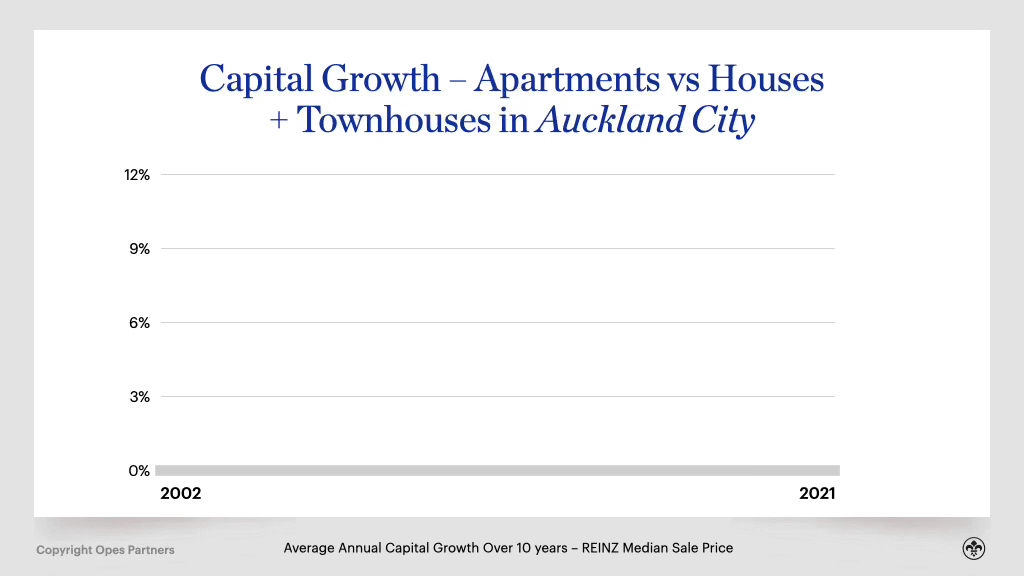
Take a look at this graph comparing the average annual capital growth of townhouses and houses (red line) to apartments (blue line) over a 10-year period.
Between 1992 and 2021, townhouses and houses had substantially higher long-term capital growth than apartments … in every single period looked at.
This carries across all the major centres. For instance, here is the data for Wellington.
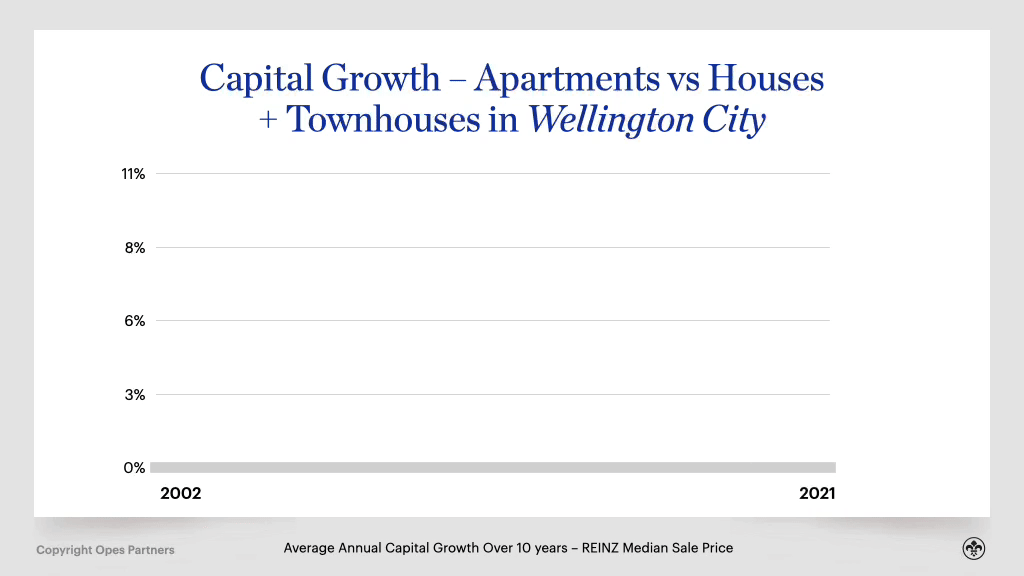
Here, the long-term capital growth rate for apartments was higher for a short time during the early 2000s, but that didn’t last long term.
This confirms that apartments really do increase at a slower rate than other property types.
Yet, despite their low-growth potential, some apartments partly compensate by providing higher rental returns. These tend to be the dual-keys.
For example, if you own a townhouse that is negatively geared by $100 a week, you might buy a dual-key apartment that earns $100 a week. This way the yield property pays for the growth property’s contributions.
However, not all apartments are high yielding.
For instance, high-end luxury apartments are typically both low yield and low growth.
These are often priced above the $1.5 million mark and sometimes well into the $2 million bracket. And while these apartments might be good for older Kiwis who are planning to downsize, they typically make poor investment properties.
Luxury apartments are good for owner-occupiers and retirees (downsizers), but often not a good investment.
This doesn’t mean luxury apartments are bad properties, it just means for investors they aren’t the best option for your money.
Obviously, apartments range in price and price depends on the spec (how nice the property is) and the location.
But here are a few examples to give you a rough idea of what real investors are currently paying.
For a more in-depth discussion, read our article about how much you should be paying for an investment property.
Safari Group, a developer who builds apartments in Auckland, Wellington and Queenstown, is currently building “The Residences”, which is an apartment block in Ellerslie, Auckland.
The development has a mix of studio, 1-bed, 2-bed and dual-key apartments built over a Ramada Hotel.
The project featured on our show The Deal last year. Watch the episode here
The units went on sale in 2021 and are due to be completed in 2023.
Prices begin at $430,000 for a studio apartment (without a car park). A 1-bed apartment with a car park is $715,000, and a 2-bed apartment is $850,000.
Dual-key apartments tend to be more expensive.
In Safari Group’s Ellerslie apartment block dual-key apartments start at $915,000 and go up to $990K.
Safari Group has another Auckland apartment block in Gillies Ave, Newmarket. Here, the dual-keys go for between $1.1 million and $1.3 million.
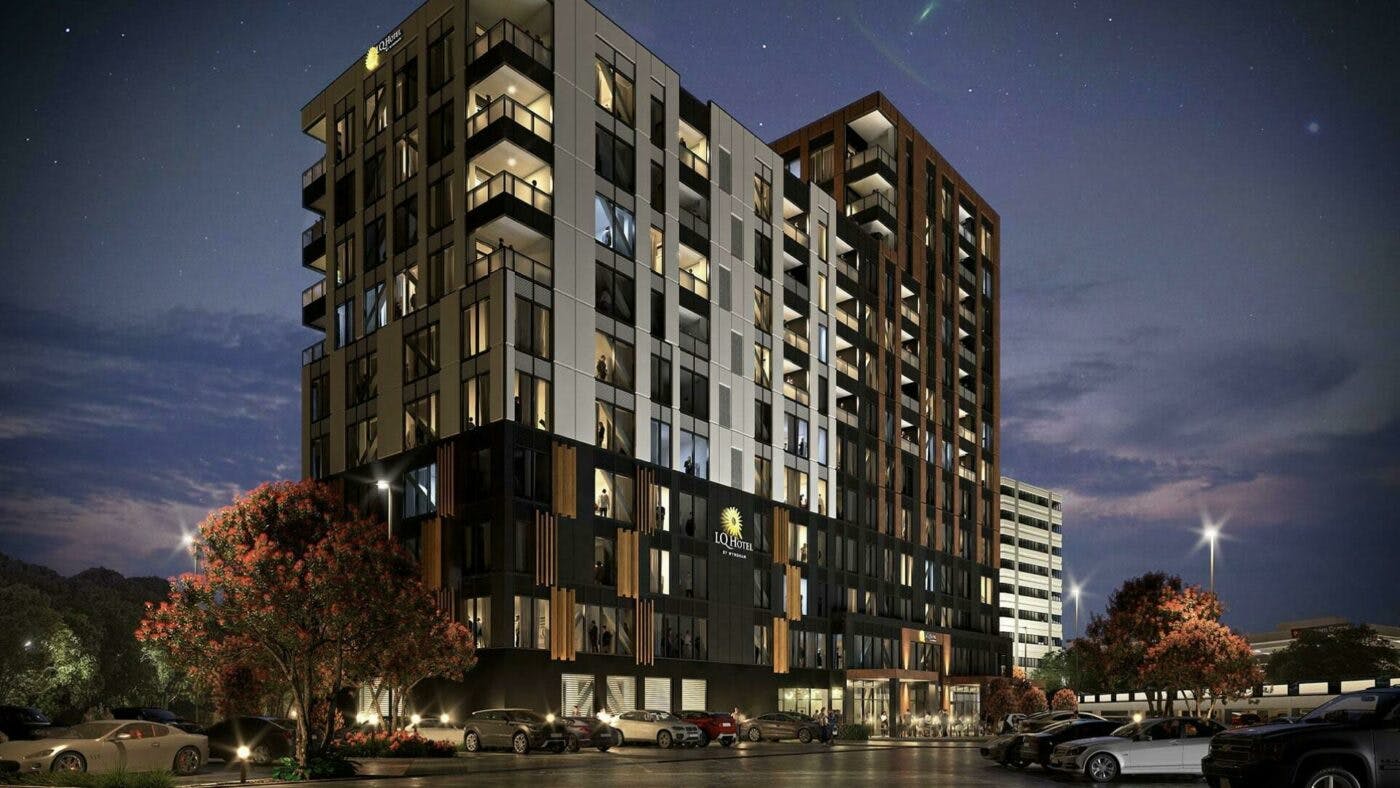
To give you a sense of how much a luxury apartment costs, developer Aedifice is currently building a 53-unit block in Auckland’s Browns Bay.
They are being marketed as luxury apartments.
The 2-bedroom apartments start from $929,000; 3-bedroom apartments start from $1.525 million; and their most expensive penthouse apartment will set you back a cool $2.695m.
While Opes recommends some Aedifice properties to investors, these types of apartments would not pass our investment criteria.
We hear you, the dual-key prices we gave you in the paragraph prior had prices around the same mark. But the dual-key apartment is a bit of an anomaly because of its two titles, which means you can get two separate rental checks for the price of one title.
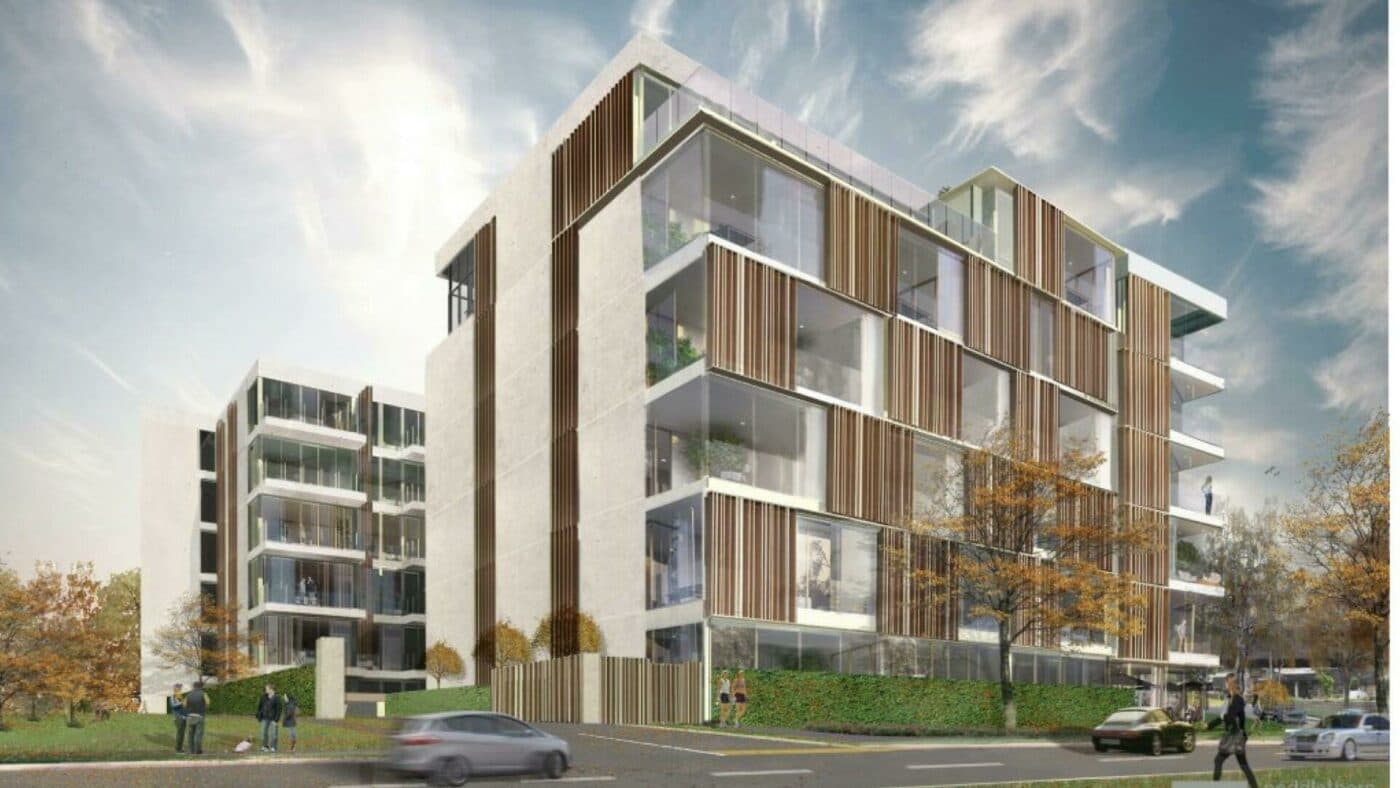
There are pros and cons for property investors wanting to purchase an apartment.
Let’s start with the pros.
So, we’ve established that apartments aren’t generally considered growth properties.
But that’s OK because what they don’t offer in growth, they can often partially make up for in their higher than average yields.
In property investment there is often a trade-off between one or the other anyway – regardless of what you are purchasing.
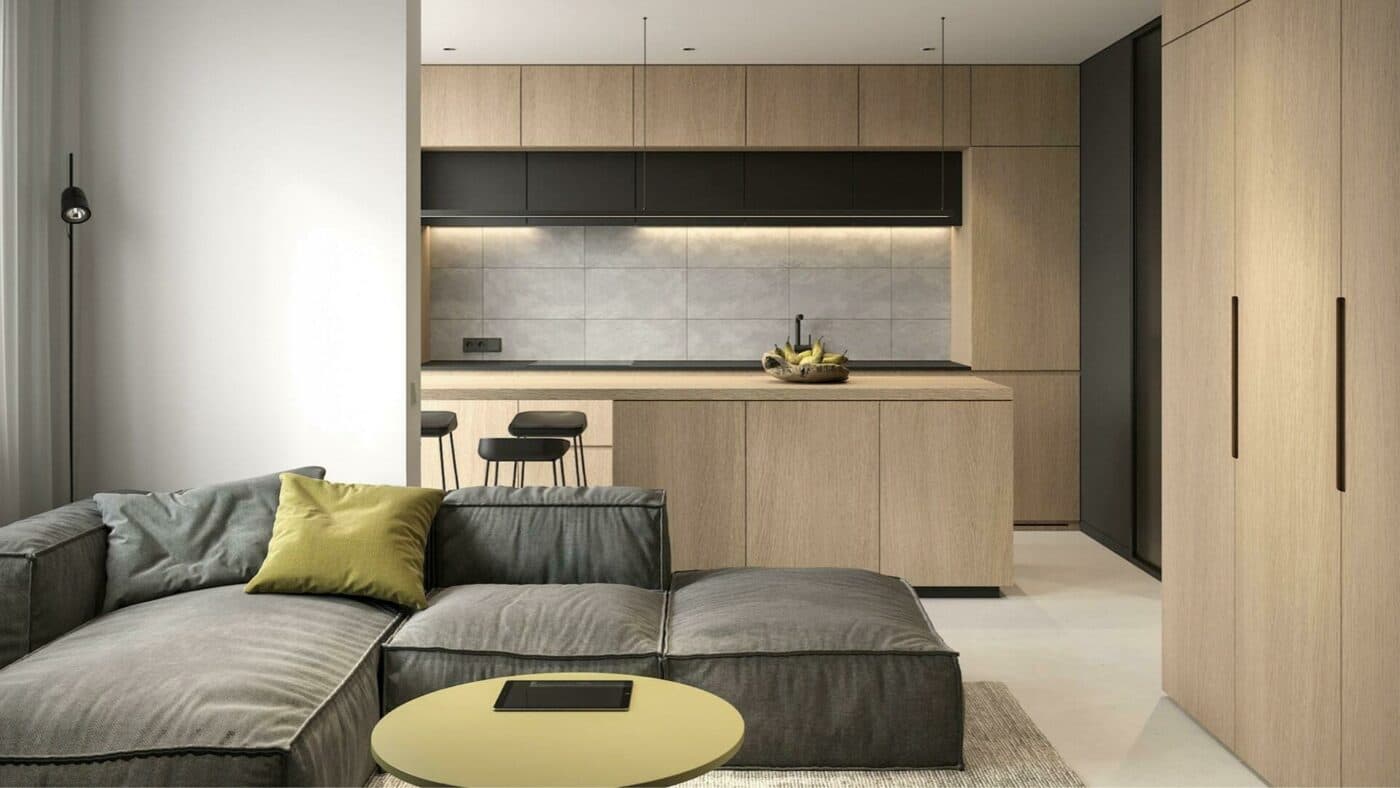
Apartments have the benefit of needing minimal direct maintenance from the investor. That’s because they are subject to Body Corporate rules and levies.
This means everyone in the building or complex shares the cost of insurance, maintenance and upkeep.
All apartment owners are members of the Body Corporate and pay different amounts depending on the size of the apartment, car parks, and the sort of amenities within the building.
These varying figures are set by a registered valuer before the build begins, who takes into consideration the value and size of each unit compared to another.
While this is an added expense, it means investors can be reassured that any issues with the building will be taken care of by the already paid for body corporate fees.
This means less stress when unplanned issues arrive.
Apartments are often located in convenient places such as town centres and are easy to find tenants for.
For instance, the Auckland apartments in Newmarket and Ellerslie are surrounded by dozens of businesses, shops and public transport – all factors that make them attractive places to live for young working professionals.
Most properties on Safari’s price list are similar to the average house price in the
suburb, making them a relatively affordable entry point into the Auckland market as well as being situated in a very central location.
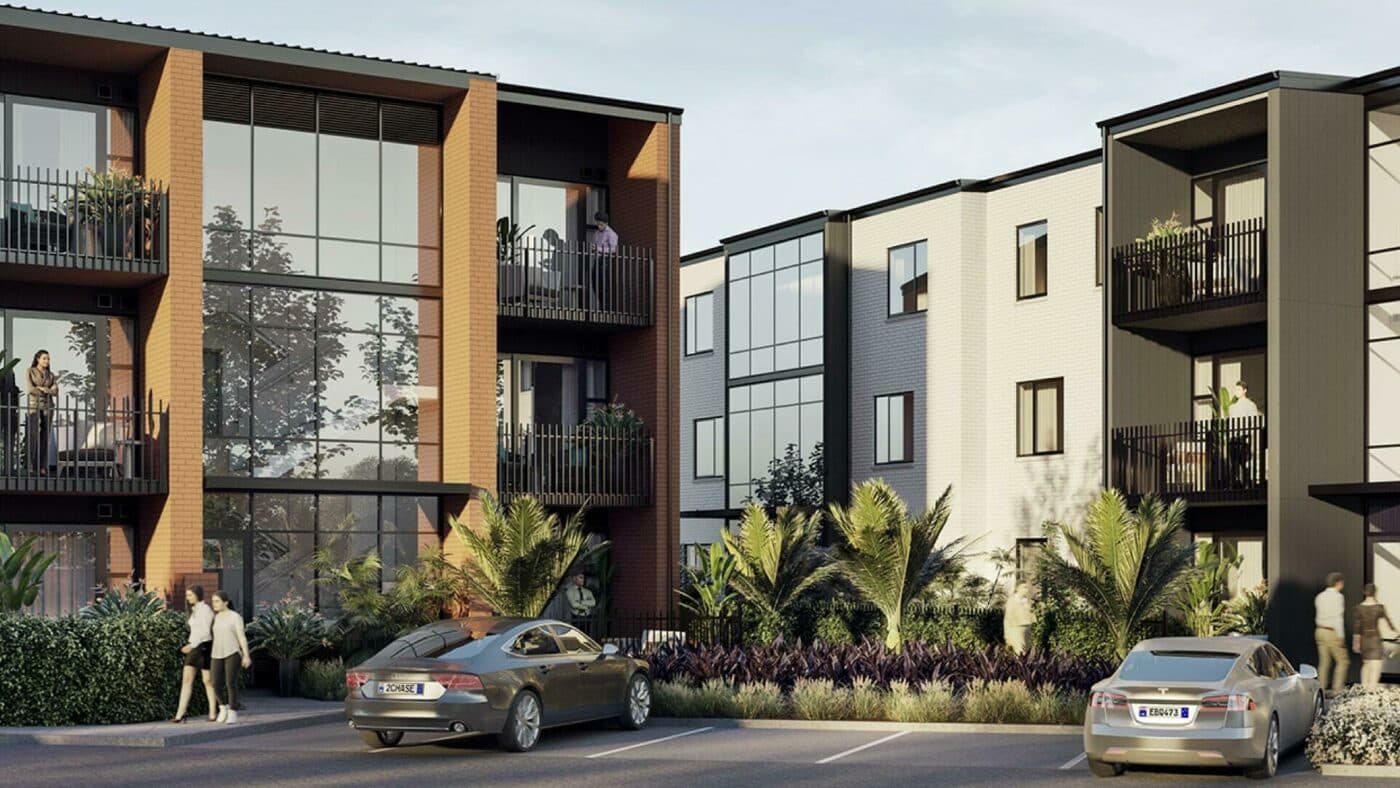
But while there are pros to apartments, they also have their drawbacks.
These properties are geared for yield. However, this means capital growth is slower than other properties.
This means these apartments are probably not the right fit for investors who are specifically looking for a high-growth element for their portfolio.
Generally speaking, apartments are high yielding. But this is not true for all.
As we have discussed above, this includes luxury apartments that sit at the much higher end of the price range.
While this may be a good option for owner-occupiers to live in or for a retiree looking to downsize, the rental return is unlikely to be worth it.
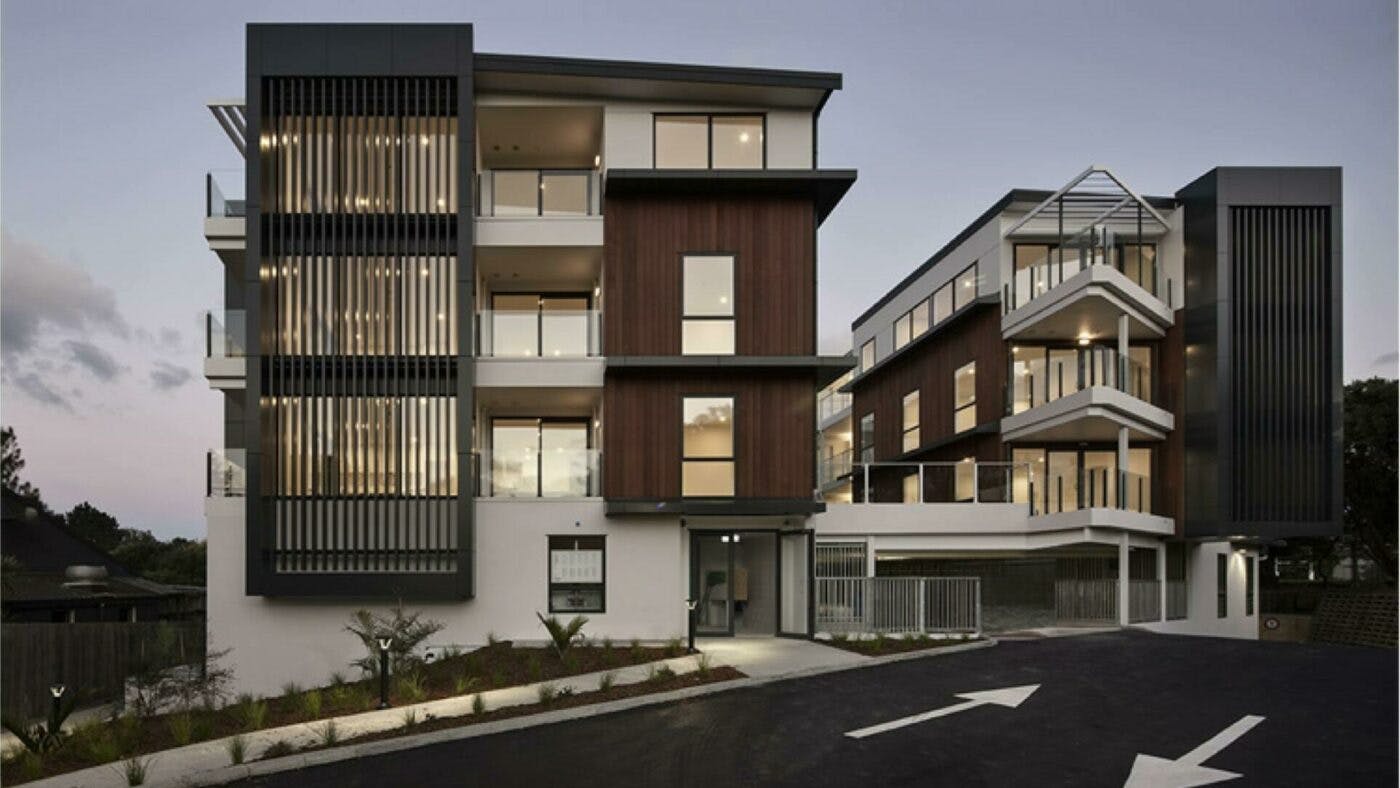
A body corporate also sets the rules for the overall building, so you will need to get permission to make any renovations to your unit.
Apartments also tend to have relatively compact floor plans, so there is little room to reconfigure the apartment in future.
This lack of control may limit the amount of potential you could get out of your property and could eliminate a renovations-based strategy.

Generally, body corporate fees should range from $2,500 - $4,500 annually, depending on what’s included.
However, sometimes the body corporate fees can be substantially higher than this.
This is especially true for some complexes that have elevators, pools and gyms. So if these nice-to-haves are within the building, expect to pay a bit more. If they’re not, expect to pay a bit less.
Similarly, some older buildings require more maintenance. That’s why they often have a ‘sinking fund’, also known as Long Term Maintenance fund. This covers long-term expensive costs.
But, if you are buying in an older building that has not had a sinking fund in place for long, you could find that you’ll pay an extra $5,000 per year (for example) in body corp fees.
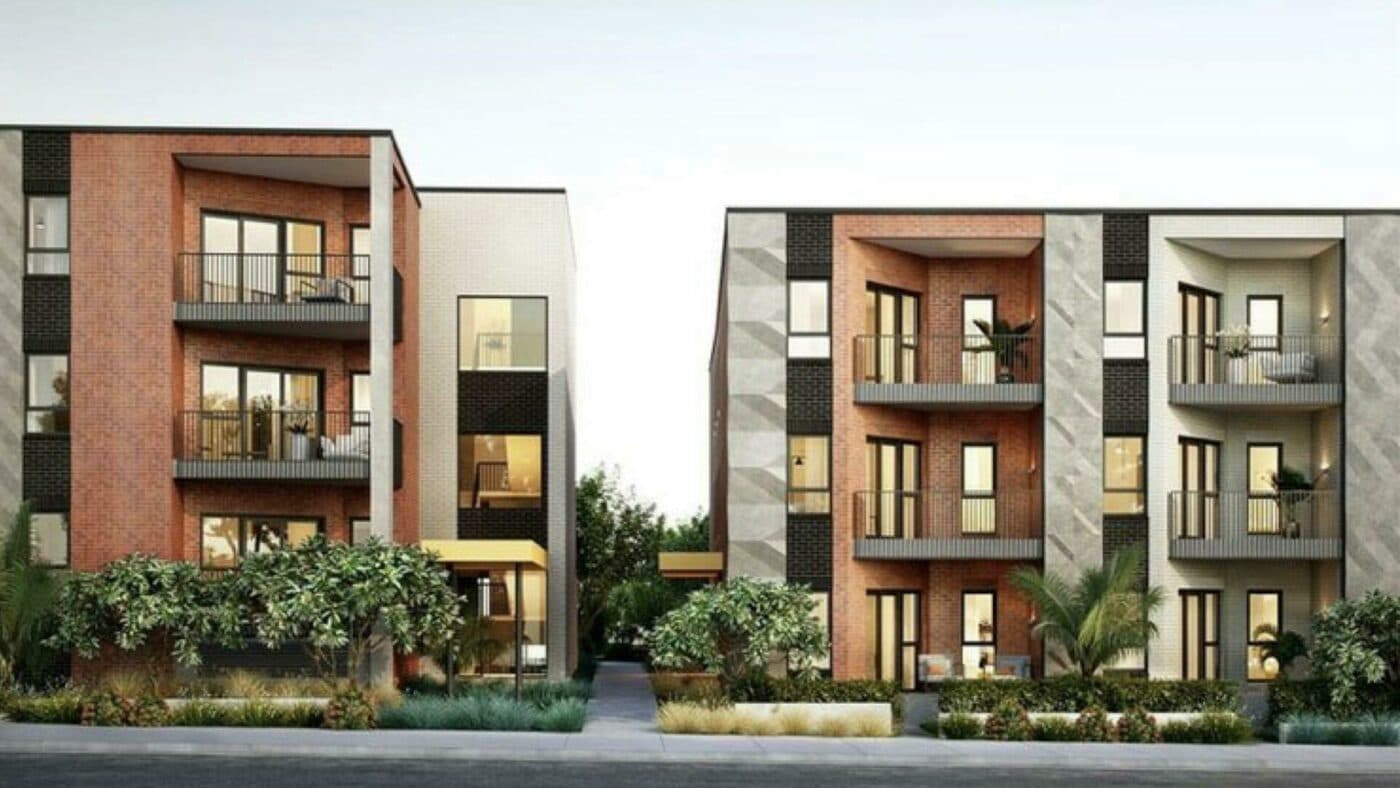
All things considered, apartments can be a good investment for some investors, but they aren’t the right fit for everyone.
Apartments can be a more affordable entry point into the market for first time investors, and their location in city centres can mean successfully buying in an area you might otherwise be locked out of.
So this can make them an option for first home buyers, or investors on a limited budget.
And while apartments aren’t generally considered growth properties, they can partially make up for it in higher yields.
That can make them a good fit for investors who are nearing retirement and want to earn a passive income from their properties.
They can also be a good fit for investors wanting to complete a Wealth Wheel.
But they aren’t being built everywhere.
For example, if you are looking to invest outside Auckland or Wellington it is unlikely that an apartment will be the right fit for you.
Write your questions or thoughts in the comments section below.
Ultimately, whether or not an apartment is a good investment comes down to the numbers, and deciding whether it is a good investment for your portfolio.
That’s why, here at Opes, we work with 58 developers from around NZ to find the right properties for Kiwi investors. And then once we find them, we rigorously run the numbers to offer good investment properties to our investors.
This means considering the apartment in an assessment of the location, the neighbourhood, the price, the rental capacity and the developer.
To find out more about how we find quality investment properties for investors click here to read about our property investment programme.
Journalist and Property Educator, holds a Bachelor of Communication (Honours) from Massey University.
Laine Moger, a seasoned Journalist and Property Educator holds a Bachelor of Communications (Honours) from Massey University and a Diploma of Journalism from the London School of Journalism. She has been an integral part of the Opes team for four years, crafting content for our website, newsletter, and external columns, as well as contributing to Informed Investor and NZ Property Investor.
This article is for your general information. It’s not financial advice. See here for details about our Financial Advice Provider Disclosure. So Opes isn’t telling you what to do with your own money.
We’ve made every effort to make sure the information is accurate. But we occasionally get the odd fact wrong. Make sure you do your own research or talk to a financial adviser before making any investment decisions.
You might like to use us or another financial adviser